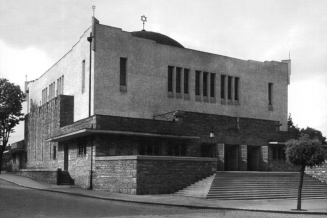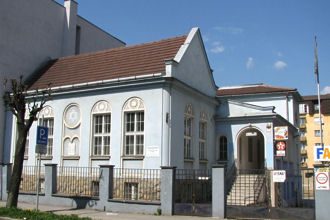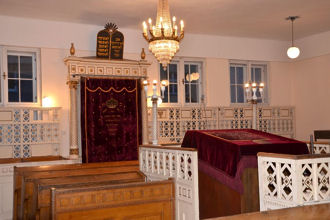Summary
The publication Zidia v Ziline (Jews in Zilina) deals with the history of this community in the town up to the present day. Zilina belongs to the most densely populated areas of Slovakia, having been a significant centre of political, cultural and economic life both now and in the bygone days. There is a very scanty relation to Jewish life in Zilina in various books, published in the past years. As if no Jews had lived here! As if their work and deeds had not existed!
However, in recent years authors do mention pertinent information concerning the Jews, albeit not enough. In absence of relevant information, various rumours abound, as well as baseless speculation and unfounded prejudice. Our book tries to fill the gap, namely, it compiles the history of Zilina Jews starting with their arrival to the city. It’s not only a debt long overdue to generations of our Jewish fellow-citizens, it is also an obligation to contemporary citizens of Zilina. They are entitled to be acquainted with all aspects of Zilina’s history.
The first account of Zilina as a city dates from the year 1312, whereas the first known urban charter comes from the year 1321. Notwithstanding the above, Jews started migrating to the area of Central Europe as early as the first few centuries A.D., following Roman Legions. Historical continuity of Jewish settlement up to the end of the 17th century on the territory of Slovakia is, however, questionable. The main regions, from which the Jews later emigrated to the Western part of Upper Hungary, are Moravia and Bohemia. The reason for this were mainly provisions aimed against the Jews during the reign of Charles (Karol) VI (1711-1740). First regions to be settled by these Jews were the territories of Western Slovakia, along the Moravian-Slovakian border. Christian tradesmen in the cities, guilds, and merchants opposed Jewish competition business. As a result, Jews couldn’t have settled Zilina as well, and, so they dwelled in its vicinity. Their aim was to benefit from municipal advantages, namely, to participate in town fairs as merchants. Close proximity enabled them to go home in the evening, and return back to Zilina in the morning. As we learn from a 1789 record, there were only two Jewish families, which were granted permission to live in the town itself. Hispaniol, and Wix. There were other Jews, living at that time in Varin, Strazov, Budatin and other settlements in the vicinity.
New rules and edicts had gradually been issued in the 19th century which, de facto, granted equal rights to the Jews. Odds are that according to 1851 census, there were 260 Jewish persons in Zilina. Pieces of information about the establishment of Jewish congregation in Zilina differ. The first year mentioned is 1850, when a Jewish synagogue and school came into being. Starting with 1851, Jewish registry office commenced its activity. It was at the time of Zilina rabbi Jozef Grünbaum. Burial Society, known as the Chevra Kadisha, was also established. New Jewish settlers estasblished their trade and business activities. Our community grew both in its numbers, and in its economic significance for the city. In 1872, the greatest taxpayers, Leopold Popper, Jakub Rosenfeld, Gabriel Spanyol and other Jews became members of municipal representatives. It was at the plenary session held on August 26,1888, during the chairmanship of Ignac Rosenfeld, when the Jewish Congregation established its Code of Rules.
Railway construction and advantageous city location led to the establishment of significant industrial enterprises and financial institutions, among other Sukenka (cloth factory), chemicke podniky (chemical corporation) Hungaria, wood pulp (cellulose) factory, firms of Natan Zelinka, Bartolomej Scheer, etc. Industrial exhibition of Upper Hungary took place at Zilina at the beginning of the 20th century. Orthodox Jews in town established a prayer association in 1912, called Adath Yesharim. Also the Jewish women association was active in these years. In 1911 the legal city representative was Dr. Rudolf Stern.







